
Virginia’s U.S. senators are throwing their weight behind a bill to support first-generation homebuyers.
The Downpayment Toward Equity Act would provide grants of up to $20,000 to support socially and economically disadvantaged homebuyers. Sens. Mark Warner and Tim Kaine are co-sponsoring the bill, alongside several fellow Democrats, saying this will help close equity gaps.
Housing experts warn, however, that substantially changing who can afford to buy in a pricey, competitive housing market like Arlington will probably require a combination of approaches.
“It helps. Of course it helps,” said Alice Hogan, a housing policy consultant with the Arlington branch of the Northern Virginia Affordable Housing Alliance. “But in a market like this, it’s not going to have the impact that it would have on other parts of the state.”
The proposed $100 billion federal appropriation would help a subset of homebuyers with expenses including down payment costs, closing costs and costs to reduce interest rates, according to a press release. It would be distributed through the U.S. Department of Housing and Urban Development.
“Homeownership is one of the most powerful pathways to accumulate wealth, but first-generation homebuyers — predominantly people of color — still face steep obstacles to achieving it and punching their ticket to the middle class,” said Warner. “The Downpayment Toward Equity Act could serve as a powerful tool to level the playing field, close the racial wealth gap, and help more families achieve their American Dream.”
In a housing market as expensive as Arlington, $20,000 grants would probably cause “a marginal increase” in who can afford to buy a home, said Michael Spotts, director of real estate development at Habitat for Humanity of Washington, DC and Northern Virginia. Grants could also help purchasers retain some cash reserves after buying a home, which plays a role in ensuring that people can sustain homeownership.
But in Spotts’ view, the main problem is Arlington’s housing stock.
“Ultimately, inventory is the binding constraint in Arlington,” he said. “If we want to support homeownership across the income spectrum and for those that have faced discrimination in the housing market, we need to increase the number of attainably-priced homes on the market.”
Hogan pointed out that some homebuyers may draw on multiple funding sources, such as Arlington’s Moderate-Income Purchase Assistance Program. This kind of “layering” is a more likely path toward homeownership for lower-income people in this county.
“In a market like this, alone, [the bill] wouldn’t do very much,” Hogan said. “It has to be in combination with other programs.”
In 2022, the county issued 13 MIPAP loans to people buying homes that cost less than $500,000. As housing costs continue to increase, some advocates say a revamp of the program is overdue.
Kaine said this bill could help fight discriminatory housing practices, the impacts of which he witnessed as a fair housing attorney earlier in his career.
“While we’ve made significant progress in combating discriminatory policies since then, their lasting effects continue to be evident in the wide homeownership and wealth gaps that people of color face,” the senator said. “The Downpayment Toward Equity Act would take a substantial step in addressing these gaps, by helping first-generation homebuyers overcome the disadvantages they face when trying to purchase a home.”
After the Alabama Supreme Court ruled that embryos created via in vitro fertilization can be classified as children, Elizabeth Carr — the first U.S. baby born this way — set out to reveal the potential consequences of this decision.
At a gathering in Ballston today (Friday) — surrounded by advocates, doctors and those who conceived or were conceived via IVF — Carr underscored the existential threat the ruling could pose.
“IVF babies of my generation, I’ve noticed, are now having their own IVF journeys,” she said. “And so, for this segment of the population, you literally are telling us the way that we came into the world is not going to be how you’re going to be able to bring your own child into the world.”
The roundtable, hosted by Sen. Tim Kaine (D-Va.), addressed threats to IVF treatment and pathways to protecting this procedure. While some participants expressed concerns these treatments could be limited, like abortion, Kaine expressed optimism that Congress could pass legislation this year protecting access to IVF.
He said there is bipartisan interest in a standalone bill with broad protections for IVF as well as specific protections for military families in the defense bill.
“I think the kinds of discussions we’re having, the attention, and the momentum on the issue give us a real shot,” Kaine said.
Couples who cannot conceive naturally, particularly same-sex couples, already face an uphill battle to growing their families, said Jay Timmons, CEO of the National Association of Manufacturers, who used IVF and surrogacy to have children with his partner.
“[Adoption] was pretty difficult for same sex couples,” said Timmons, a McLean resident. “We walked into it fairly naively and went through all the home checks and everything until the very wonderful social worker said, ‘Okay, I’m gonna put [Jay] down as the adopter, and I’m gonna put Rick down as your roommate.”
“And so we kind of processed that and said, ‘We’re not going to bring a child into our family under the pretence of a lie.'”
Kaine says Democrats are actively seeking support from Republican senators for the Access to Family Building Act, which he co-sponsored, guaranteeing access to IVF. Although Republicans blocked a vote on the bill last week, Kaine remains optimistic that it could surpass the 60-vote Senate threshold required for the bill’s passage.
“I wouldn’t want to pass this out of committee on an 11 to 10 vote,” he said. “I would want to pass it out on a real bipartisan vote, and I think we could do that.”
Should the comprehensive IVF bill stall, Kaine says Democrats could at least build protections for military families into the upcoming defense bill, potentially setting a precedent for future legislation.
“President [Harry] Truman, when he integrated the military in the 1940s, it set an example that then influenced the rest of society,” Kaine said. “If we do something in the defense bill for troops, their families, and veterans, I think it’ll send a powerful message that could then move us down the road toward broader protection.”
Last week, the Alabama state legislature approved a bill that shields IVF providers from civil lawsuits and criminal charges related to the destruction of damaged embryos. In Virginia, Republican lawmakers and Gov. Glenn Youngkin, who has advocated for limiting abortion access, have expressed support for safeguarding access to IVF treatments.
Kaine said people will not be fully protected unless Congress intervenes.
“I’m very concerned, and that’s why we need to do the federal bill because Alabama saying, ‘Okay, we will not criminally prosecute you,’ is not the same as saying, ‘We embrace IVF,’ and so it leaves a lot of gray areas,” he said.
“State legislatures could change every two years,” Kain continued. “State legislators are not doctors or scientists. They write bills that are vague, that make providers worry… Let’s just make it clear: that if you want to build your family through IVF, you can.”
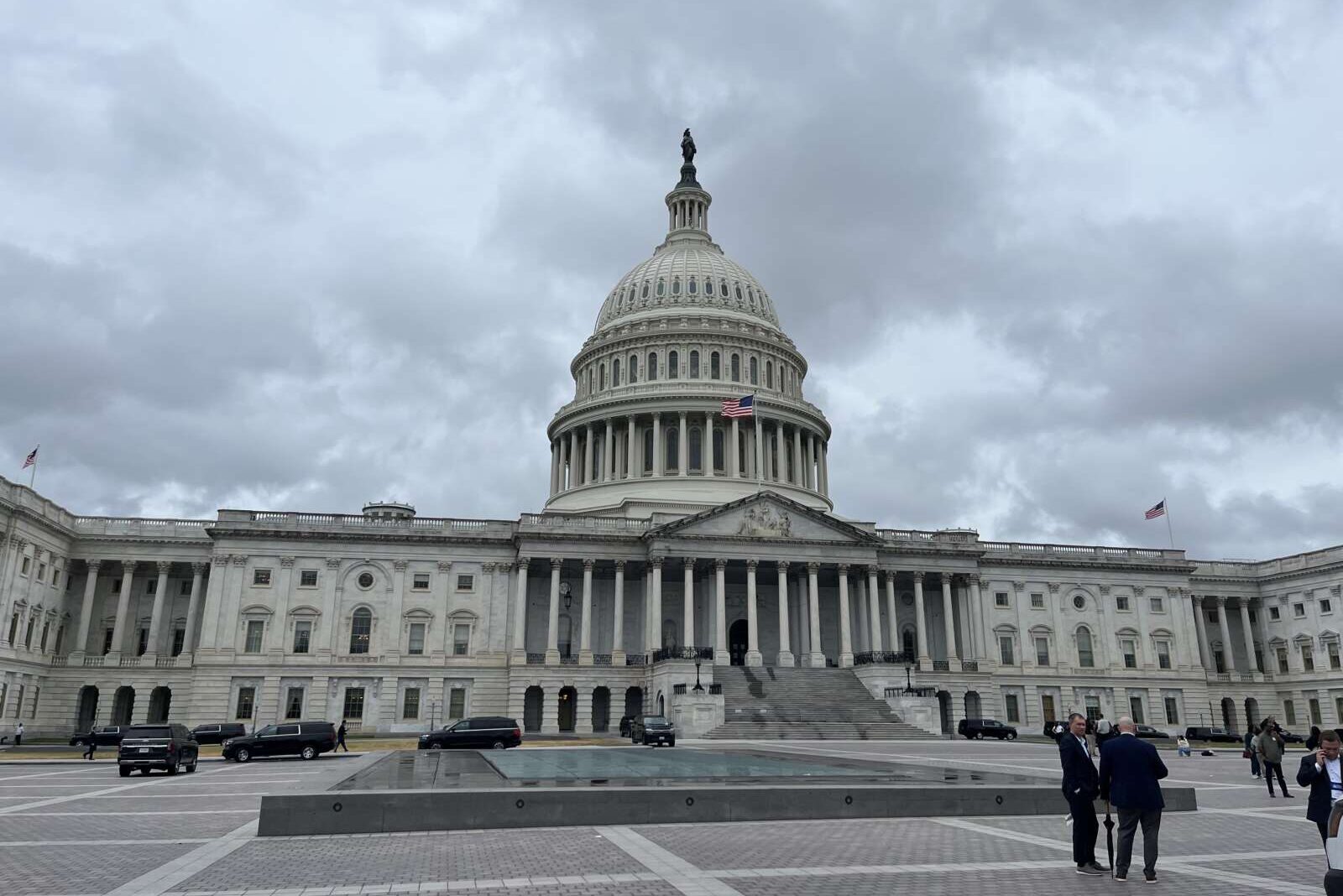
Amid fears of a government shutdown, Rep. Don Beyer (D) is urging colleagues to remember the federal workers who would lose their paychecks if no spending plan is passed.
Yesterday, House Republicans recessed for a week after failing to pass a bill to stave off a shutdown. That could happen if lawmakers on Capitol Hill do not reach a deal before the federal government runs out of money next Saturday, Sept. 30 at midnight.
If that happens, essential workers — including military personnel, federal law enforcement and air traffic controllers — would continue working, possibly without pay.
Some 2.2 million permanent, civilian, non-postal employees could also miss their paychecks, Beyer said in a statement Wednesday. This includes more than 140,000 in Virginia, according to federal workforce data.
The last time this happened, in 2018, Beyer received letters from Virginia federal workers describing how they and their families were hurt by lost wages and benefits. He shared snippets of these letters this week.
“I am a single mother to three small children. My ability to provide for my children stops the moment the government goes into shutdown,” wrote one constituent in a 2018.
Another federal worker underscored the uncertainty a shutdown causes.
“It is the undefined length of this shutdown, the not knowing, that is the worst part,” the letter said. “Nevertheless, we continue to go to work each day without pay and without knowing what the future holds.”
Millions of government contractors also stand to lose their pay and benefits. Beyer shared a 2019 letter describing the lengths to which one owner of a small federal contracting business went to keep paying staff.
“I have expended out available cash and have taken loans against my home to keep paying our employees,” wrote the business owner and disabled veteran. “I am now at a decision point. Do I borrow more money, or do I lay off my hardworking employees?”
Unlike federal employees, contractors are not guaranteed back pay from missed wages. Around 10,000 companies with government contracts were affected by the 2018-19 shutdown, the Washington Post reported.
With the funding deadline looming, Beyer says his colleagues should remember these 2018 shutdown testimonies and consider most Americans live paycheck to paycheck.
“Many are caught up in palace intrigue and legislative drama right now, but I urge my colleagues to remember that there are a lot of real people out there who will be hurt if there is a government shutdown,” he said. “These letters and emails show how shutdowns are a disaster for my constituents, our region, and millions of Americans across the country.”
The shutdown may also affect everyday Americans who do not rely on a paycheck from the federal government, Virginia Sen. Tim Kaine (D) says.
Kaine emphasized in a press release that the 2018 shutdown led to delays in everything from flights to tax refunds and mortgage approvals due to the absence of thousands of furloughed employees, including air traffic controllers and IRS agents.
“While I will continue working with my colleagues to prevent a shutdown, we should never be in this position to begin with,” Kaine said.
Earlier this month Kaine and Beyer introduced the End Shutdowns Act, which would have initiated an automatic continuing resolution on Oct. 1 if no appropriations bill was passed by that time. Additionally, the will would have”stop[ped] the Senate from moving forward with any other legislation, outside of an emergency scenario, until Congress reached an agreement on a long-term spending deal.”
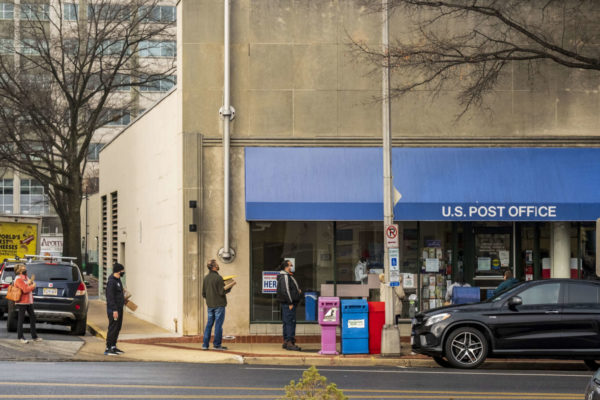
The saga of slow mail delivery in Arlington continues.
Now, U.S. Senator Tim Kaine (D) is bringing the county’s issues to the federal government.
There have been grumblings for years of spotty mail delivery service in parts of Arlington. Locals frequently post stories of their problems getting or sending mail on the social media platform Nextdoor.
Now, Kaine is asking the United States Postal Service to review these frustrating experiences and provide explanations and a list of steps USPS will take to fix them.
“I am concerned that Virginia communities as far-flung as Smyth County in Southwest Virginia, the Richmond area (nearly 300 miles away from Chilhowie by highway), and Arlington, across the river from Washington, D.C., are all experiencing missing bills, medications, tax documents, and days/weeks without mail,” Kaine wrote in a letter — which he sent electronically.
“My constituents are understandably frustrated and eager to know if help is on the way. I appreciate any information you can share,” he continued.
Kaine referenced one specific story he heard from an Arlingtonian who “repeatedly went several days without mail over the period of several months and did not receive specific items, including a Virginia Auto Registration from the DMV and a Virginia Driver’s license.”
In the letter, he included the response from USPS:
After investigation and consultation with local management, it has been found that the office may experience delivery delays due to employee availability issues. However, they are taking the steps necessary to ensure every effort has been made to deliver the mail daily. The route in which your constituent resides is current however delivery on this route maybe later in the day. Once again, please allow us to apologize for the unfortunate customer experience.
His letter also detailed issues from other parts of the state, including missed mail or infrequent or late-at-night delivery as well as never-returned phone calls requesting assistance.
“I request that you review these concerns, provide information on how these are being addressed, and share what factors are causing what appear to be systemic challenges with processing mail promptly and getting it successfully to the right place,” he said.
Within the last week, one Colonial Village resident took to Nextdoor to say it took two weeks for a check to go no more than four miles as the crow flies.
“I can top that,” a neighbor replied. “My mother in law showed us two pieces of mail that she just got returned to her. The postmark was from 2021.”
“A few months ago I mailed a letter 2-day Priority, Signature Required at the 22204 Post Office,” a third user said. “It took 8 days to get to a 22201 address!”
Some users were more optimistic, calling on neighbors to increase their use of USPS.
“We should keep using the Postal system because the more we use it, the more funding there is, the better the service will get,” wrote one woman.
Another issued a recruiting call to arms.
“Let’s spread the word to older teens and twenty-somethings looking for work that not just the Post Office, but the Federal Gov’t itself needs sufficient numbers of good public servants in order to run well,” she said.
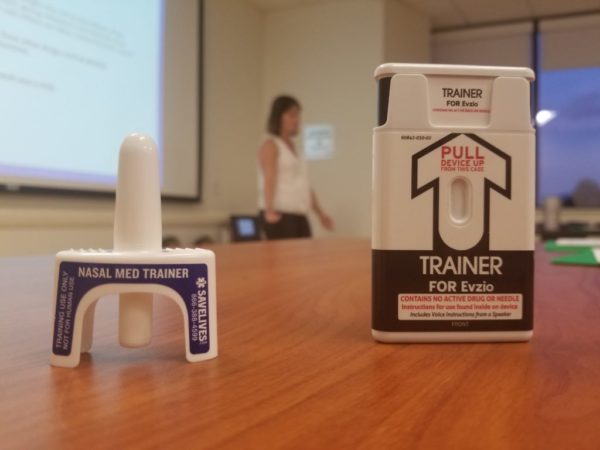
(Updated at 2:45 p.m.) Today is the first day high school-aged Arlington Public Schools students can carry naloxone in schools.
Students in grades 9 and above can now carry the opioid reversal drug if they have consent from a parent or guardian, according to the school system. Those who are at least 18 years old can also provide consent if they wish.
The policy change comes four months after the fatal overdose of a 14-year-old at Wakefield High School in January. The death of Sergio Flores has led to calls for changes at APS by teachers, parents and School Board members — including a push to have more naloxone in schools and to let kids carry it.
Any student who carries the overdose-reversing drug — the most well-known brand of which is the nasal spray Narcan — must provide the day they were trained and agree to call 911 and notify school staff if used in school or at a school activity, per a presentation to the School Board last night (Thursday).
Consent may be provided through an online authorization form or via the family portal ParentVue, an option APS says will be available by the end of the day today.
Students who need training may attend training hosted by Arlington Addiction Recovery Initiative on Thursday, June 1 at Washington-Liberty High School from 7-8 p.m. Another training session is planned for the week of June 5.
Meanwhile, U.S. Senator Tim Kaine (D-Va.) came to Arlington today to discuss substance use and the fentanyl crisis. He participated in a roundtable at National Capital Treatment and Recovery (521 N. Quincy Street), an addiction treatment center in the Ballston area.
This facility is preparing to resume offering options for teens seven years after ending its youth programs. Those services will begin June 5, a spokesman for the center told ARLnow Friday afternoon.
Consumption of fentanyl — a powerful synthetic opioid that can be prescribed or taken illegally — contributed to the deaths of nearly 2,000 Virginians in 2022, per a press release announcing Kaine’s visit.
While the number of fatal, fentanyl-involved overdoses in Arlington was not readily available, as of last Thursday, there have been seven fatal overdoses so far in 2023, according to publicly available county data.
This year there have been a total of 61 opioid incidents, of which 22 were overdoses and the rest were possession and distribution cases, according to county data.
As fentanyl-related deaths have risen, the federal government has responded with calls for de-stigmatizing addiction and for increased access to naloxone. Two months ago, the Food and Drug Administration approved an over-the-counter version of the nasal spray Narcan.
Arlington County, meanwhile, has joined lawsuits against pharmaceutical companies linked to the opioid crisis, putting settlements toward treatment. It reexamined its teen programming to provide youth and young adults with more positive experiences and steer them away from drug use.
Last week, Kaine introduced legislation with Joni Ernst, a Republican senator from Iowa, to declare fentanyl trafficking a national security threat and direct the Pentagon to work with other federal agencies and Mexican officials to tackle drug trafficking by transnational criminal organizations, the release said.
Kaine says he is also pressing the federal government to dedicate more resources to the crisis and ease access buprenorphine, which, like methadone, is used in addiction therapy to replace the effects of a stronger substances.
Additionally, the senator joined other lawmakers in asking Meta — which owns Facebook, Instagram and WhatsApp — to address drug trafficking on its platforms.
Election Day is here, and thousands of residents are hitting the polls — manned by 426 volunteers — to cast their ballots in the 2022 mid-term election.
By 9 a.m., about 10% of Arlington voted in-person, according to the county elections office, in addition to the 13% of people who voted early and in-person and 7% who voted by mail.
“The polls have been steady so far this morning,” said Tania Griffin, spokeswoman for the Arlington Office of Voter Registration and Elections.
Turnout in a midterm is typically about half the turnout of a presidential election, Arlington Director of Elections Gretchen Reinemeyer previously told ARLnow.
Just over 20,000 people voted early in this year’s general election, Griffin said. Combined with the more than 11,000 absentee ballots sent in, Virginia Public Access Project says Arlington’s early voting rate surpasses those for Northern Virginia and the state. (Nearly 5,000 have not returned the mail ballots they requested.)
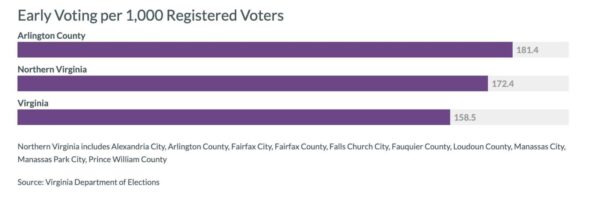
In 2018, the last midterm election, 21,147 ballots were cast early, per VPAP.
While early voting got off to a muted start to in September, and was “slightly slower” than last year’s election, local and statewide Democrats celebrated early voting numbers yesterday during a rally at the home of Matt de Ferranti, the Democrat Arlington County Board incumbent running for re-election.
“The trends are positive, particularly in the three parts of the state that have really competitive congressional districts. We see high numbers, and we really see good Democratic advantage in the early vote,” said U.S. Sen. Tim Kaine (D-Va.), who came out for the rally. “We really like what we’re seeing.”
In the local U.S. House race, Arlington voters can choose among Democrat incumbent Rep. Don Beyer and his two challengers for the 8th District, Republican Karina Lipsman and independent Teddy Fikre.
Kaine said one top driver for races this year is the economy, which he characterized as a mixed bag.
“You have inflation but you have historic job growth. Inflation might make you worry if there’s a downturn coming, but then you see how strong job growth is — during Biden’s term, 10 million-plus jobs, manufacturing coming back, big job announcements with Amazon,” he said. “I think the evidence will be mixed.”
Among the countywide races, voters can choose between two School Board candidates — independent, Sun Gazette-endorsed James “Vell” Rives IV and Arlington County Democratic Committee-endorsed Bethany Sutton.
In Arlington, the most watched race this year is likely that for County Board, which has become a showdown on the topic of Missing Middle housing — the proposal to open up single-family zoning to smaller-scale multifamily housing.
De Ferranti said that could have driven the relatively higher early voting showing.
“The early vote we’re seeing is so stepped up that we’ll have to see what the total turnout is,” de Ferranti said. “This is greater turnout than 2018 so far, and I think some of that is the discussion we’re having on housing.”
His challengers for County Board — frequent independent candidate Audrey Clement and second-time candidate Adam Theo — say Missing Middle is a litmus test this election.
“After squeezing in last minute doorknocking yesterday, and all the responses I’m receiving this morning at precincts, I’m feeling very optimistic for the campaign and the success of the Missing Middle housing proposal,” Theo told ARLnow.
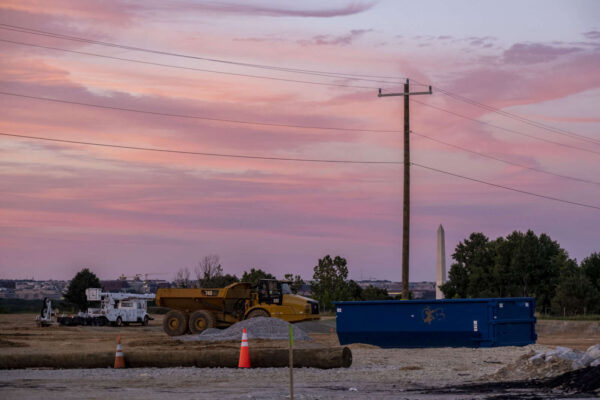
Arlington Resident Moving to San Diego — Baseball superstar Juan Soto, who recently moved to Arlington, has been traded by the Nats to the San Diego Padres. He’ll presumably take with him some photos and art that were framed at a Clarendon frame store. [MLB]
Fairfax Barricade Ends — Updated at 9:25 a.m. — A man reportedly barricaded in a condo with a rifle near Lake Barcroft has been taken into custody. The barricade situation prompted a Fairfax County police helicopter to circle over parts of Arlington for hours. [FFXnow, Twitter]
County Getting Part of Opioid Settlement — “It’s not a princely sum, but cash is cash and the Arlington County government is set to receive its share of a new payment based on a legal settlement with a number of opioid distributors… Of the first settlement payout, about $9.94 million will go to the state government’s Opioid Abatement Authority and about $4.07 million will be distributed to localities. Arlington is entitled to 1.378 percent of that latter figure, which works out to $56,034.” [Sun Gazette]
Ballston Quarter Gets Small Tax Break — “Owners of the Ballston Quarter retail-restaurant-and-entertainment complex came away from a recent Board of Equalization hearing with a very partial victory, as that body reduced the property’s assessed valuation but not nearly as much as its owners had sought. On a unanimous vote, Board of Equalization members on July 13 voted to reduce the assessment rate – which is used to calculate the property’s annual tax bill – from $91.1 million as determined by staff to $86.7 million.” [Sun Gazette]
Va. Sens. Celebrate Vets Bill — “Today, U.S. Sens. Mark R. Warner and Tim Kaine celebrated Senate passage of the Sergeant First Class Heath Robinson Honoring Our Promise to Address Comprehensive Toxics (PACT) Act of 2022 following obstruction efforts by Senate Republicans last week. This legislation will expand health care and benefits for toxic-exposed veterans under the Department of Veterans Affairs.” [Sen. Mark Warner]
YHS Grads Makes Youth National Team — “Yorktown High School graduate Lauren Flynn was named to the U.S. Under-20 Women’s Youth National Team soccer roster for the FIFA Women’s World Cup in Costa Rica from Aug. 10-28.” [Sun Gazette]
Feedback Sought for Eco Plan — “Arlington County would like your input on the draft Forestry and Natural Resources Plan. To assure future generations of Arlingtonians enjoy the benefits of nature, the County must identify what needs are urgent, what are aspirational, and how each can be addressed through both long-term initiatives, incremental change and immediate action.” [Arlington County]
Crash in D.C. Shut Down Chain Bridge — From WTOP’s Dave Dildine: “Chain Bridge closed both ways along with Canal Road and Clara Barton Parkway at the bridge. A crash occurred when traffic signals were malfunctioning. Witnesses say an officer was struck under the malfunctioning signals. These lights fall out of phase frequently.” [Twitter]
It’s Wednesday — Another hot and humid day. High of 90 and low of 71. Sunrise at 6:13 am and sunset at 8:19 pm. [Weather.gov]

(Updated at 12:45 p.m.) Local lawmakers have again introduced legislation to officially remove Robert E. Lee’s name from Arlington House.
For fifty years, “Arlington House, the Robert E. Lee Memorial” has been the official name for the National Park Service-managed mansion that sits on top of a hill at Arlington National Cemetery.
But in recent years, there has been a push to drop Lee’s name from the memorial and return it to its original name of simply “Arlington House.”
In 2020, Rep. Don Beyer (D-Va) proposed legislation to do just that since Arlington House lies in his district. The bill was co-sponsored by two other local representatives, Rep. Gerry Connolly (D-Va) and Rep. Jennifer Wexton (D-Va), along with D.C. Congressional delegate Eleanor Holmes Norton.
Beyer said at the time that the legislation was partially inspired by requests for a name change from descendants of those who were enslaved at Arlington House. However, the bill never got out of committee and no change was made.
Two years later, though, these local lawmakers are trying again with a bicameral push.
The House bill is co-sponsored by Beyer, Connelly, Wexton, and Norton while a new Senate bill is sponsored by Tim Kaine (D-Va). The legislation, if passed and signed into law, would strip the Confederate general’s name from the house he once lived in.
“If we are serious about ending racial disparities, we need to stop honoring those who fought to protect slavery,” Kaine said in a press release. “I’m proud to be part of the effort to rename Arlington House, and am going to keep fighting for the kinds of reforms we need to create a society that delivers liberty and justice for all.”
This year’s bills are very similar to the one from 2020, Beyer Communications Director Aaron Fritschner confirmed to ARLnow, save for small language changes including adding a formal historic site designation.
If the legislation does pass, the mansion would officially be called “The Arlington House National Historic Site.”
The building that now sits inside Arlington National Cemetery was first built by enslaved people in the early 19th century to be the residence for George Washington Parke Custis. It was also intended to be a memorial to George Washington, Custis’s adoptive grandfather.
Custis’s daughter Mary Anna Randolph Custis married Robert E. Lee in 1831. The soon-to-be Confederate general was known to be a cruel and sometimes violent head of the household.
During the Civil War, the Union Army seized the house as well as the grounds and turned it into a military cemetery.
In 1955, Congress passed legislation to designate the house as the “Custis-Lee Mansion.” The name was changed again in 1972 to what it is today, “Arlington House, the Robert E. Lee Memorial.”
For years, Arlington House was featured prominently in the county’s logo. That changed last year after a push to remove the house from the logo, in large part due to its formal name and association with Lee.
(An earlier version of this article incorrectly stated Lee’s relationship to the house and property.)
Virginia Gov. Glenn Youngkin, Sens. Mark Warner and Tim Kaine, and Rep. Don Beyer joined the leaders of Boeing and Virginia Tech at the former’s Crystal City headquarters this morning to announce a new veterans initiative.
The announcement that drew the state’s top elected officials was the creation of the Boeing Center for Veteran Transition and Military Families at the new Virginia Tech Innovation Campus at Potomac Yard in Alexandria, just down the road.
It comes just over a month after Boeing announced that its existing Crystal City office campus would become the company’s global headquarters. While the move will only result in a relatively small shift of personnel from the existing headquarters in Chicago, it was highly touted by Youngkin, Warner and other elected officials.
“Boeing’s recent announcement to move its headquarters to Virginia and reaffirm its commitment to building the next generation of tech talent is a timely development for the Commonwealth, and is made more exciting by their extensive partnership with Virginia Tech,” Youngkin said in a statement.
“Their pledge to create the Boeing Center for Veteran Transition and Military Families ensures that the Commonwealth and its businesses continue to invest in diverse career pathways for veterans and students alike, all the while helping businesses thrive,” the governor continued.
The new Boeing Center, part of the company’s previously-announced $50 million investment into Virginia Tech’s new campus, is set to provide veterans with “economic and workforce programs,” mental health resources, and community service opportunities, according to a separate news release from Boeing.
“This is just a very important service that our military veterans need, a big assist to get into civilian life and to pursue civilian livelihoods, and to pursue tech degrees and all those things,” Boeing CEO Dave Calhoun said during the announcement.
“Virginia has about 725,000 veterans that call Virginia their home, 155,000 active duty, reserve and National Guardsmen, and I’m biased, I want them to stay in Virginia,” Youngkin said during the announcement.
In addition to the veterans center, Boeing also plans to provide scholarships to Innovation Campus students, facilitate the recruitment of faculty and researchers, and fund STEM initiatives to underserved K-12 students.
“I hope it gets very big,” Calhoun said. “Just suffice to say, we’re going to take advantage of this location and try to attract as many young people as we possibly can to this trade and to our company.”
The press release from the governor’s office is below.
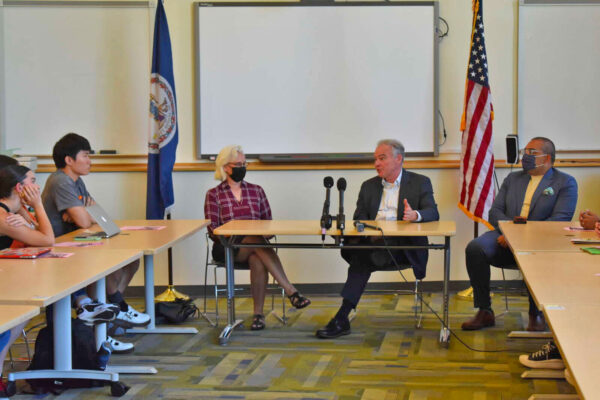
Only days before graduation, Wakefield High School students questioned Virginia Sen. Tim Kaine (D) about what can be done to pass gun legislation in Congress
Kaine paid a visit to Wakefield on Monday afternoon, in the wake of another school shooting, to speak with students about gun violence and increasing safety in their classrooms. He was joined in the school’s library by about 30 students as well as Arlington School Board Chair Barbara Kanninen and Arlington Public Schools Superintendent Francisco Durán.
It was four years ago when Kaine came to Wakefield to talk about the same thing.
After speaking for about 15 minutes, the Virginia senator took questions from the students — many of whom were seniors and only about ten days from graduation. The students questioned the senator about Congress’s inaction, filibustering, bans on assault rifles, and the specific impact gun violence has on communities of color.
“Why are we having the same conversations over and over again?” asked one student.
“Assault rifles are often used in shootings and their purpose is to kill as many people as possible. So, what work has been done [in banning them]?” questioned another.
“What can we do to stop this endless cycle? We protest… and nothing happens,” another student asked, clearly emotional.
Kaine listened and answered each one, expressing optimism that at least some legislation might be passed in the coming weeks that could expand background checks and red flag laws. However, he agreed with the skepticism of some of the students.
“I have to admit, I do have a little feeling of skepticism, not despondency, but I have a little feeling of skepticism,” he said. “We’ve been here before and tried this… but we can’t give up.”
Kaine brought a number of times the 2007 Virginia Tech shooting that happened when he was governor. It was as an event, he said, that “scared” him and made him realize the needed urgency for gun control laws.
He also frequently touted the “Virginia Plan to Reduce Gun Violence Act,” a measure that he and fellow Virginia Sen. Mark Warner introduced last year. It’s based on a series of state bills in Virginia which were signed into law in 2020, calling for universal background checks, a 30-day wait period between handgun purchases, and prohibiting those with protective orders from possessing a firearm. Notably, though, the bills didn’t ban assault weapons or high capacity magazines.
Kaine also called using the Second Amendment as reasoning for not expanding background checks, enforcing wait periods, and limiting the size of magazines as a “poppycock argument.”
“You can’t take away completely people’s right to bear arms, but you can impose reasonable regulations,” he said.
Members of Congress from Virginia are pushing the federal government to help fund proposed changes to Route 1.
The changes, while still being hashed out by VDOT and local officials, would lower elevated portions of Route 1 through Crystal City to grade, turning it into a lower-speed “urban boulevard.” VDOT is also mulling at least one pedestrian bridge or tunnel at 18th Street S., near the Metro station, to improve safety.
With the first phase of Amazon’s HQ2 on track to open in Pentagon City in 2023, state and local officials see a need to turn the area — collectively known as National Landing — into a more cohesive downtown and economic center. Key to that vision is revamping Route 1, also known as Richmond Highway, which effectively separates Pentagon City from Crystal City.
At last check, cost estimates for the project were around $200 million.
Northern Virginia’s congressional delegation would like to see the feds foot much of the bill, through funding from the 2021 bipartisan infrastructure bill.
In a joint letter to Secretary of Transportation Pete Buttigieg, the lawmakers say argue that the Route 1 project meets all criteria for funding through the infrastructure bill.
“This grant request will allow Virginia to convert the Route 1 corridor in Arlington into a multimodal urban boulevard that prioritizes pedestrian safety in a walkable environment,” the wrote. “VDOT is developing multimodal solutions for Route 1 to meet National Landing’s transportation needs with the coming of Amazon and other related developments.”
The letter was signed by Sens. Tim Kaine (D-Va.) and Mark Warner (D-Va.), along with Reps. Don Beyer (D-Va.), Abigail Spanberger (D-Va.), Donald McEachin (D-Va.), Elaine Luria (D-Va.), and Robert Wittman (R-Va.).
“The Commonwealth’s commitment to Amazon is to improve safety, accessibility, and the pedestrian experience crossing Route 1,” the lawmakers wrote. “Investment in National Landing will produce significant, measurable benefits to the economy, health, and safety of local citizens… This project satisfies all the merit criteria outlined in the federal grant opportunity, especially the priorities of providing economic, state of good repair, environmental, and equity benefits.
The letter also argues for the project’s fiscal benefits, including reducing bridge maintenance costs and providing acres of additional land for development.
“The transformation of Route 1 to an urban boulevard includes the removal of three bridge structures from the VDOT inventory, which will reduce long term maintenance costs,” the letter said. “Modifications to the I-395 interchange will remove a structurally deficient bridge and avoid future replacement or rehabilitation costs, while also extending the urban boulevard to the north which will contribute to lower speeds.”
“[The project] increases the accessibility to job centers through the proposed access improvements, which will benefit residents of all income levels,” the letter continues. “The project will create approximately 6.5 acres of excess right-of-way resulting in high value developable land.”
Another hoped-for benefit: fewer cars and better safety features.
“It will reduce the need for single-occupancy vehicle trips in favor of environmentally friendly options such as enhanced transit service, walkability, biking routes,” said the letter. “The project also includes multiple innovative solutions, such as a progressive design-build strategy and a pilot safety project to implement near-miss crash technology in National Landing.”
The completion of VDOT’s Phase 2 study of the proposed changes is currently expected to wrap up in early 2023. While the project has general support from the county and the business community, some residents have expressed concerns about whether taking away overpasses in favor of at-grade crossings actually makes things more dangerous for pedestrians.
Much of the congressional delegation, led by Kaine, also wrote a letter to Buttigieg supporting funding for an I-64 connector to ease congestion between Richmond and Hampton Roads.

